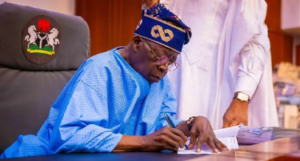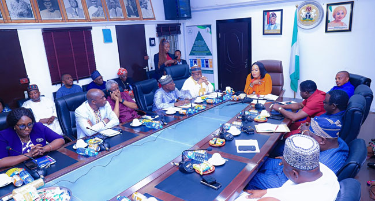The Tripartite Committee on National Minimum Wage has submitted its report to the Secretary to the Government of the Federation (SGF). This marks the conclusion of the committee’s assignment, as disclosed in a statement signed by the Director of Information and Public Relations in the office of the SGF, Segun Imohiosen. He mentioned that a formal presentation of the report will be made to President Bola Tinubu. This will occur once the leadership of the Organised Labour, as well as representatives from the Government and Organised Private Sector, return from the ongoing International Labour Organisation (ILO) Conference in Geneva, Switzerland.
The SGF extended his gratitude to the Chairman of the Committee, Bukar Goni Aji, and all committee members for their commitment and sacrifices throughout this process. President Tinubu had previously inaugurated the 37-member Tripartite Committee on National Minimum Wage on Tuesday, January 30, 2024, in accordance with the provisions of the Minimum Wage Act of 2019. The primary responsibility of the committee was to recommend a new national minimum wage for Nigerian workers in both the public and private sectors.
The submission of the report on Monday comes after the committee recommended a new minimum wage of ₦62,000. This recommendation concludes months of deliberations and numerous meetings between the Federal Government, organised labour, and the organised private sector. However, it is important to note that the organised labour has proposed a significantly higher minimum wage of ₦250,000, which is a reduction from its earlier proposal of ₦494,000.
Following the submission of the report, President Tinubu is expected to send an executive bill to the National Assembly for legislative action. Despite these extensive deliberations, the Nigeria Governors’ Forum (NGF) has expressed concerns, stating that the earlier proposal of ₦60,000 is unsustainable. According to the governors, many states would be unable to undertake other critical projects if this proposal were to be implemented.

The labour unions had temporarily suspended their industrial action to allow for negotiations with the government. However, on Monday, Chris Onyeka, the Assistant General Secretary of the Nigeria Labour Congress (NLC), reiterated the union’s stance on the minimum wage issue. Onyeka insisted on ₦250,000 as the minimum wage, stating that accepting ₦62,000 or any lower figure would not be sufficient to meet the needs of Nigerian workers. He emphasized that the NLC’s proposal is driven by the realities of the market and the daily expenses that workers face, including the cost of essential goods like rice, yam, and garri.
In his address to the media, Onyeka stated, “We have never considered accepting ₦62,000 or any other wage that we know is below what we know is able to take Nigerian workers home. We will not negotiate a starvation wage. We have never contemplated ₦100,000 let alone ₦62,000. We are still at ₦250,000, that is where we are, and that is what we considered enough concession to the government and the other social partners in this particular situation. We are not just driven by frivolities but the realities of the marketplace; realities of things we buy every day: bag of rice, yam, garri, and all of that.”
As the nation awaits the return of the delegation from the ILO Conference and the subsequent actions by President Tinubu, the discourse on the appropriate minimum wage continues to be a significant topic of discussion among stakeholders. The outcome of this process will have a profound impact on the livelihoods of millions of Nigerian workers and the overall economic landscape of the country.




